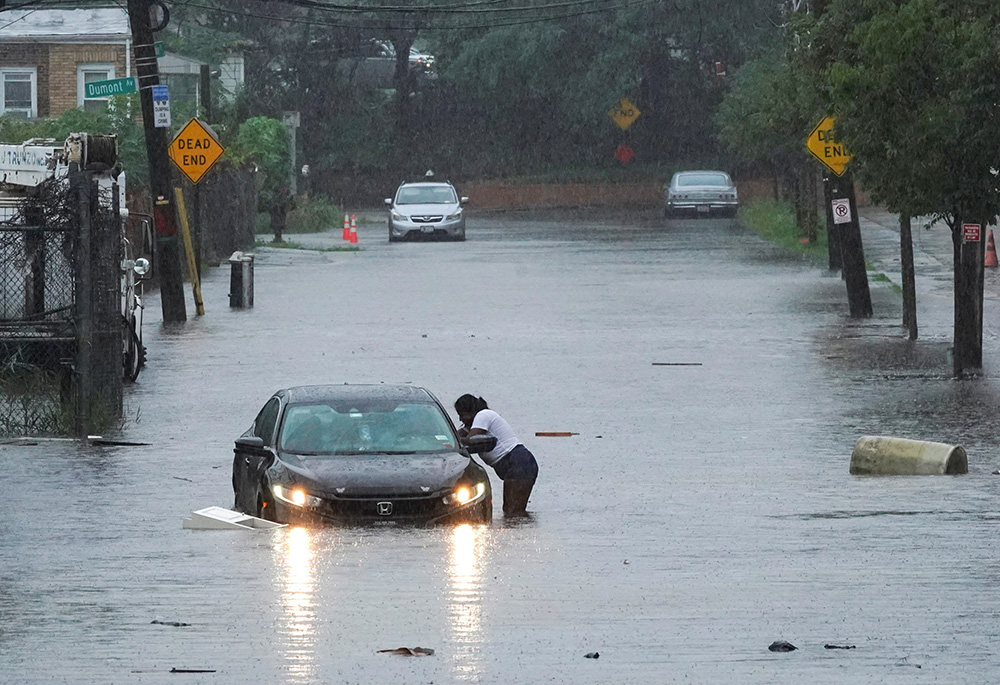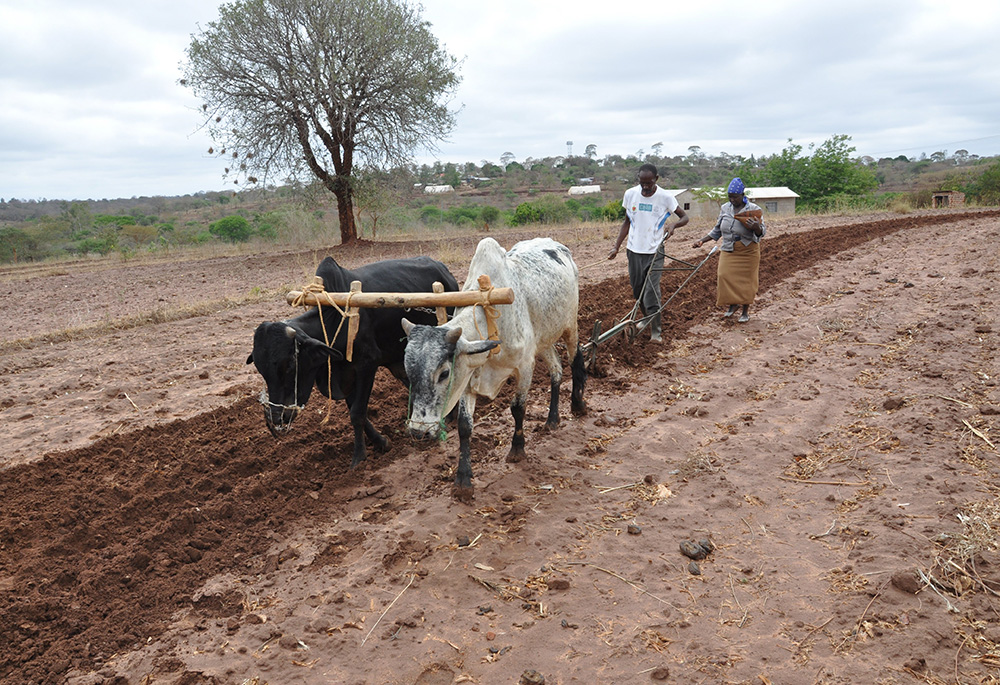![Pope Francis addresses the meeting, "Faith and Science: Towards COP26," with religious leaders in the Hall of Benedictions at the Vatican in this Oct. 4, 2021, file photo. Francis on Oct. 4, 2023, released a document castigating Western nations for "irresponsible lifestyle[s]" causing irreparable harm to the planet. (CNS/Paul Haring)](/files/2023-10/20211004T0615-POPE-RELIGIOUS-COP26-APPEAL-1509469.jpg)
Pope Francis addresses the meeting, "Faith and Science: Towards COP26," with religious leaders in the Hall of Benedictions at the Vatican in this Oct. 4, 2021, file photo. Francis on Oct. 4, 2023, released a document castigating Western nations for "irresponsible lifestyle[s]" causing irreparable harm to the planet. (CNS/Paul Haring)
Amid a year of record-breaking rising temperatures, wildfires and flooding and ahead of a major U.N. climate summit this winter, Pope Francis on Oct. 4 released a new document taking direct aim at climate change deniers and castigating Western nations, particularly the United States, for "irresponsible lifestyle[s]" causing irreparable harm to the planet.
"The world in which we live is collapsing and may be nearing the breaking point," warns Francis in an 11-page letter titled Laudate Deum ("Praise God").
The document comes just eight years after the pope's landmark 2015 encyclical, "Laudato Si', on Care for Our Common Home," in which the pope endorsed the scientific consensus on the need for global efforts to confront climate change and warned that humanity was creating a world of "debris, desolation and filth."
Francis says in the new text that he is writing again because "our responses have not been adequate," and with a particular eye toward the upcoming 2023 United Nations Climate Change Conference, or 28th Conference of the Parties to the U.N. Framework Convention on Climate Change, better known as COP28, which will take place from Nov. 30-Dec. 12 in Dubai.
While the pope addresses the letter to all people of goodwill and calls for concrete individual actions in response to the climate crisis, he says that "above all" urgent political decisions must be made at both the national and international levels to stave off impending environmental catastrophe.

A passenger speaks with the driver of a vehicle stuck in waters from flash flooding in New York City Sept. 29, as remnants of Tropical Storm Ophelia brought flash flooding across the mid-Atlantic and Northeast. "The world in which we live is collapsing and may be nearing the breaking point," warns Francis in Laudate Deum ("Praise God"). (OSV News/Reuters/Bing Guan)
"If we consider that emissions per individual in the United States are about two times greater than those of individuals living in China, and about seven times greater than the average of the poorest countries, we can state that a broad change in the irresponsible lifestyle connected with the Western model would have a significant long-term impact," writes Francis.
While the letter is brief — especially compared to the 184-page document in 2015 — the pope dedicates significant attention to both the progress and failures in combating climate change at the international level over the last 30 years.
Francis hails the headway that has been made in the annual U.N. summits in establishing mechanisms for richer countries to compensate poorer countries for damage that climate change has inflicted on them (commonly known as "loss and damage" programs), and the commitments of countries to decreasing global temperatures to levels below those of the industrial revolution.
But he also warns that progress is not happening quickly enough and that past agreements have lacked the necessary monitoring and enforcement means.
Advertisement
"If there is sincere interest in making COP28 a historic event that honors and ennobles us as human beings, then one can only hope for binding forms of energy transition that meet three conditions: that they be efficient, obligatory and readily monitored," he writes. "This, in order to achieve the beginning of a new process marked by three requirements: that it be drastic, intense and count on the commitment of all."
"That is not what has happened so far, and only a process of this sort can enable international politics to recover its credibility, since only in this concrete manner will it be possible to reduce significantly carbon dioxide levels and to prevent even greater evils over time," he warns.
Cardinal Michael Czerny, a close adviser to Francis and the head of the Vatican's Dicastery for Promoting Integral Human Development, told NCR via email that in the new exhortation, the pope "challenges our leaders to lead us in the real changes that are urgently needed so that the climate crisis won't get even worse." He added that the exhortation also "invites everyone actively to push our government(s) in this direction."
While the release of Francis' 2015 Laudato Si' was intentionally timed to build support for the historic Paris climate meeting — its architect, Christiana Figueres, told Earthbeat that Francis is "one of the strongest [leaders] in the world, if not the strongest" on environmental concerns — in the new Oct. 4 apostolic exhortation, the pope indicates that he is exasperated by the resistance and confusion by those that fuel misinformation about the realities of climate change.

A Kenyan farmer tills and plants his farm Nov. 3, 2022, in Machakos. African bishops said as people struggle against the current global climate crisis, they are losing biodiversity and traditional seeds. Francis cites a 2022 decree from African bishops in his new letter Laudate Deum. (CNS/Fredrick Nzwili)
"In recent years, some have chosen to deride these facts. They bring up allegedly solid scientific data, like the fact that the planet has always had, and will have, periods of cooling and warming," writes Francis, in unusually terse language for a pope. "They forget to mention another relevant datum: that what we are presently experiencing is an unusual acceleration of warming, at such a speed that it will take only one generation — not centuries or millennia — in order to verify it."
While the document offers a high-level of technical and scientific analysis for a papal document, it also draws from reflections on climate change by a number of episcopal conferences from around the world, including the U.S. Catholic bishops, and even cites an American feminist scholar, Donna Haraway.
The letter's goal, writes the pope, is "to express bluntly that this is no longer a secondary or ideological question, but a drama that harms us all." Citing a 2022 decree from African bishops, he says that inaction on climate for Catholics is "a tragic and striking example of structural sin."

Pope Francis arrives to attend a celebration marking the feast of St. Francis in the Vatican Gardens October 4, 2019. (CNS/Reuters/Yara Nardi)
The Oct. 4 release date of Laudate Deum — the sixth and shortest apostolic exhortation released during his decadelong papacy — was timed to coincide with the Catholic feast day of the pope's namesake: St. Francis of Assisi, the 12th century saint known for his concern for the poor and the environment.
It is also the date of the final day of what is known as the "Season of Creation," a monthlong ecumenical initiative aimed at inspiring greater prayer and environmental action among Christians — and in the final line of the document, the pope offers a specific warning to people of faith.
" 'Praise God' is the title of this letter," writes Francis. "For when human beings claim to take God's place, they become their own worst enemies."






